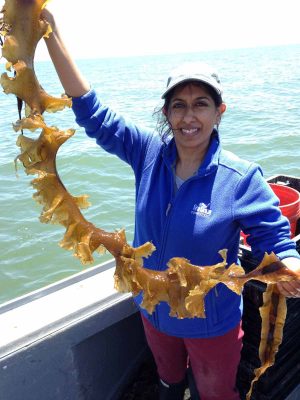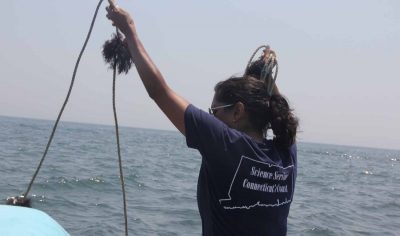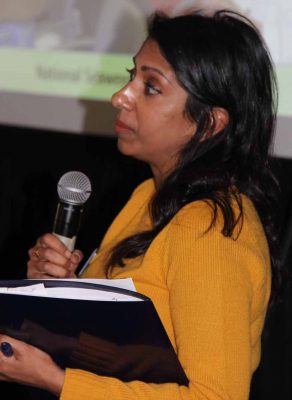
Editor’s note: In recognition of May as Asian and Pacific Islander American Heritage Month, Connecticut Sea Grant is pleased to share a question-and-answer interview with Anoushka Concepcion, extension educator and aquaculture extension specialist.
Q. When did you join Connecticut Sea Grant, and what does your position there entail?
A. I formally joined Connecticut Sea Grant in 2011, however, I had a temporary position beginning in 2010. I am an extension educator in marine aquaculture. As an extension educator, I respond to Connecticut’s diverse stakeholder needs by conducting applied research and providing various types of assistance with regulatory, public health and business questions. I mainly focus on seaweed aquaculture, an emerging industry that holds great promise but must overcome some significant obstacles.
Q. What was your academic and career path prior to coming to Connecticut Sea Grant?
A. I have been very fortunate to have most of my jobs related to the sciences. As an immigrant child growing up in New York City, I was exposed to marine science during trips to the aquarium with my public school. I applied to the University of North Carolina at Wilmington for my undergraduate degree in marine science and never looked back. I loved every minute of it.
After college I got a job at a shrimp hatchery and then went to the University of Rhode Island to pursue my Master of Science degree in aquaculture. I found my way to Connecticut Sea Grant several years later and couldn’t be happier. I love my job and the people I get to work with every day
Q. Was there a key experience that led to your decision to pursue a career in aquaculture?
A. While still at UNCW, I took a trip with my parents to India to visit family. We passed a fish farm during our journey and my father said, “This is what you should be doing with your degree in Marine Science—fish farming. Think of all of the people you can feed in our village.” Aquaculture was something I had never considered, but I knew right then it was something I wanted to do. I decided that would be my career path and immediately began looking for an internship or job in aquaculture.
I was very lucky to land a job at a shrimp hatchery in the Florida Keys. There I ran the microalgae lab, which provided the food for the larval shrimp in the hatchery. It was one of the most difficult jobs I ever had (16-hour days, seven days a week during the busy season), but I developed a respect for hard work and the practical challenges of being a farmer—most importantly—living paycheck to paycheck. It was an eye-opening experience, exposing me to the reality of being part of a small business and its many challenges. The real-world challenges I experienced at the shrimp hatchery help me in my work with Connecticut Sea Grant. I inform prospective farmers about the many challenges that exist with the emerging seaweed industry in the United States and never sugar-coat the truth. It is my job to ensure they are well informed of these challenges to better enable them to make the right decision about pursuing seaweed farming.
Q. How has your experience as the daughter of Indian immigrants has shaped you personally and professionally?
A. My parents are very proud of their culture. I grew up speaking our native language and ate traditional meals every night. My parents also reminded me how privileged I was to grow up in the United States of America. While working hard was paramount, giving back (known as the practice of “karma yoga”) was equally important. I volunteered every summer vacation from the age of 13, sometimes for only a few weeks, but it taught me about helping others. I always keep that in mind when working with stakeholders. They come to me for help, and it is my responsibility to provide them with any assistance I can.
Q. Have you encountered incidents of bias that have affected your work, and how have you dealt with them?
A. I haven’t experienced direct incidents of bias, but there have been many situations where I have been made to feel uncomfortable. I was once recruited for a job simply because I was a minority female, which “checked off all the boxes.” My experience in marine aquaculture seemed to be only of incidental importance. I thanked them for their interest and informed them I was happy with my current position.
I have also experienced being ignored, talked over, bullied and even walked away from. It can take a toll on someone’s self-esteem, which most likely was the intention. Despite these encounters, I have been extremely fortunate to have the support of the amazing leadership in the Connecticut Sea Grant program and UConn’s Cooperative Extension program. I always feel heard, encouraged, respected and valued. That support has helped me focus on doing the best job I can do.
Q. You are currently involved in leadership roles in some national and international groups working to advance the seaweed industry, as well as a seaweed economics project. Please elaborate on these projects and the work you’re doing with them.
A. My primary responsibility is to serve Connecticut stakeholders, however, many of the challenges and needs seaweed stakeholders in Connecticut face are similar to those in other states. To address these emerging needs, I recruited Sea Grant colleagues from across the country to establish the National Seaweed Hub, an online resource for non-advocacy, science-based information that was set up in January 2020. A major component of the Seaweed Hub is the formation of four diverse stakeholder-driven work groups to tackle challenges and come up with practical solutions which address everyone’s needs. As the project’s lead investigator, I coordinate all the moving pieces and assist my amazing Sea Grant colleagues. It is exciting to see the different stakeholder groups working together from across the country to make great things happen for the emerging seaweed industry.
A challenge which came out of the needs assessment conducted as part of the National Seaweed Hub was to address the lack of information on start-up costs of kelp farming. A project on the economics of kelp production led by Robert Pomeroy, emeritus professor in the UConn Department of Agricultural and Resource Economics and Connecticut Sea Grant College fisheries extension specialist, will provide much needed information. It will also provide business planning tools and guides for potential investors. It is another example of how Sea Grant responds to stakeholder requests. My role is to support Dr. Pomeroy and coordinate communications between the Sea Grant Extension partners.
Recently I was asked to serve on the Steering Committee for the Safe Seaweed Coalition, a global partnership and UN-recognized effort to increase the production of seaweed aquaculture outside of Asia. It is an amazing opportunity to collaborate with other countries to determine how we can increase the commercial success of seaweed farming in the United States.

Q. What were some of the earlier seaweed projects you were involved in, pertaining to public health regulations and other issues relating to laying the groundwork for this industry?
A. Over the last several years, I have led projects focused on developing food safety guidelines on the production and processing of local seaweeds. This partnership with the Connecticut Department of Agriculture came out of a need they had to ensure the seaweed being grown in local waterways was safe for human consumption. There was no federal guidance and the state struggled to answer questions from aquaculture producers and others about the safety of Connecticut seaweeds. After eight years of applied research projects, we developed a guidance document used by kelp farmers to develop food safety plans for their seaweed, allowing them to safely harvest and sell fresh kelp as a food source. However, the work is still not done as more questions continue to emerge. Collaborating with the state agriculture and consumer protection departments, as well as with local seaweed farmers has been a wonderful experience in that everyone’s needs are addressed, which is enabling an emerging industry to grow.
Q. Why is seaweed an important area of focus for CT Sea Grant?
A. Connecticut Sea Grant funded one of the leading U.S. researchers in seaweed aquaculture, UConn’s emeritus Professor Charles Yarish, more than 30 years ago, to fill in critical knowledge gaps in understanding the life cycle of our native sugar kelp (Saccharina latissima). Since then, Connecticut Sea Grant has continued to support research in seaweed aquaculture. Most recently, advocacy groups have generated huge interest in this emerging form of aquaculture, but the information can become a bit confusing for general audiences. There is a need for non-advocacy, science and evidence-based information to help these audiences understand the facts and to make more informed decisions. This is where Sea Grant becomes the trusted source of information.
Q. What are some of the other kinds of projects you’ve been involved in with Sea Grant, not specific to seaweed?
A. I was hired by Connecticut Sea Grant to assist shellfish farmers with direct marketing initiatives. After talking with the members of the industry and regulatory agencies, my Sea Grant colleagues and I realized the need for specific guidance on the regulatory process and public health considerations for directly marketing shellfish, as many direct marketing resources that addressed other issues were already available. After working with farmers and regulators, I developed a guidance document outlining the process on how to safely market shellfish to consumers. This document became especially useful several years later during the COVID-19 pandemic when restaurants closed, and farmers needed to shift their sales directly to consumers instead of to restaurants.
I have also assisted my Connecticut Sea Grant colleagues on several projects related to shellfish including assisting with the Connecticut Shellfish Initiative and the annual Gathering of Shellfish Commissions meetings. I have also assisted with project-related fieldwork and public outreach activities.

Q. Why should young people consider pursuing careers in marine sciences and aquaculture, and what advice can you offer to those who are interested?
A. My advice would be: if you find marine science interesting, pursue it! There are many aspects to marine science that you can specialize in. Also, don’t discount aquaculture. In addition to providing ecosystem services, aquaculture is the new frontier in feeding the world nutritious food when conducted responsibly.
I would also suggest not focusing exclusively on taking marine-specific courses. Many marine researchers are experts in microbiology, molecular biology, chemistry, physics, engineering and social science. Some even have their MBAs. One last piece of advice: have a core team of mentors who have your best interest in mind. Great mentors can guide you, provide advice and lend their support. You will need them throughout your career. Also, always be kind to everyone you work with. You never know if your paths will cross again or you need a favor.
Q. What’s your favorite part of your job at Connecticut Sea Grant?
A. I have a few favorite parts to my job. The first one is building and maintaining long-term relationships within the various stakeholder groups we work with. Many of them have become frequent project partners and even friends. The same goes for work colleagues. Some of my very close friends (and trusted project partners) are my Sea Grant colleagues.
I take pride in knowing we are a trusted source of non-advocacy information based in science and facts, which empowers stakeholders to make the best decisions for themselves. That makes stakeholders feel comfortable working with us.
Q. What’s one of the most interesting or satisfying experiences you’ve had since you started working at Connecticut Sea Grant?
A. An interesting, but sometimes daunting part of my job, is giving someone information they may not want to hear. For example, when I meet with a prospective farmer about starting a kelp farm their excitement is high, but after we start talking about the challenges preventing the industry from moving forward, their mood often changes to one of melancholy. While I feel badly, they usually thank me for being honest and straightforward and can move forward with realistic expectations, if they so choose.
A. satisfying component to my job is knowing the work we do is making an impact. When stakeholders write letters of support for our programs whenever we are at risk of losing funding, it tells me we are a valued and necessary part of their decision-making process, and that makes me feel very positive about my work at Connecticut Sea Grant.